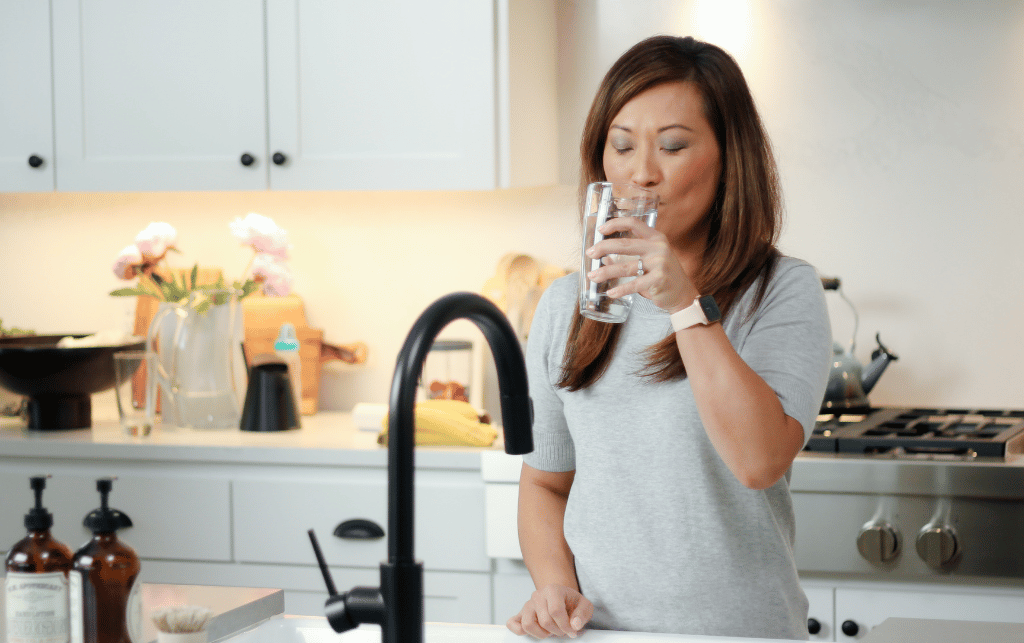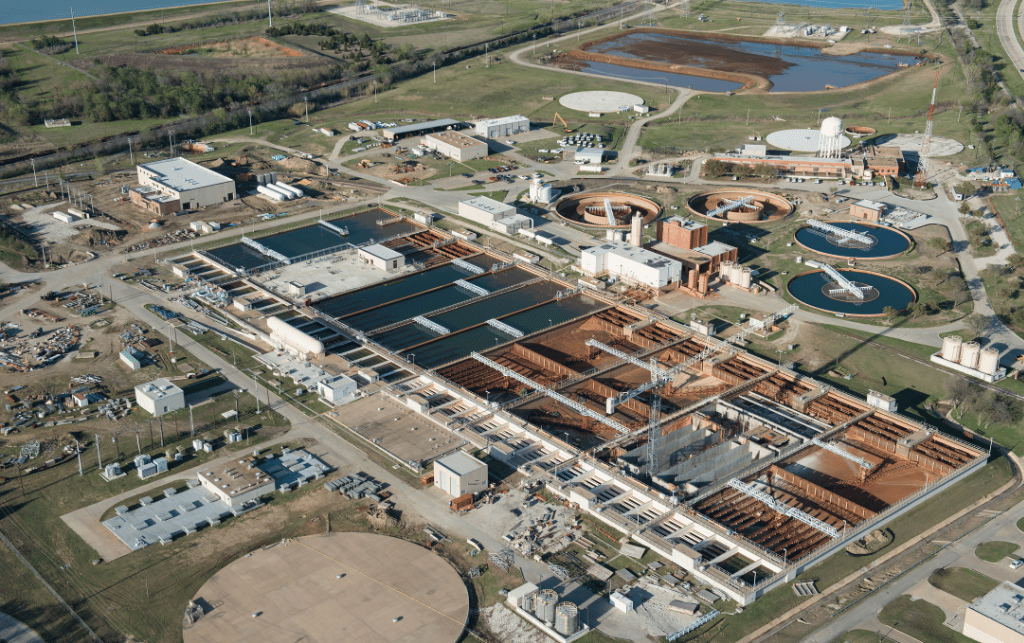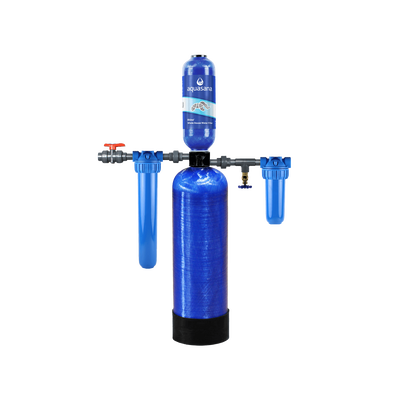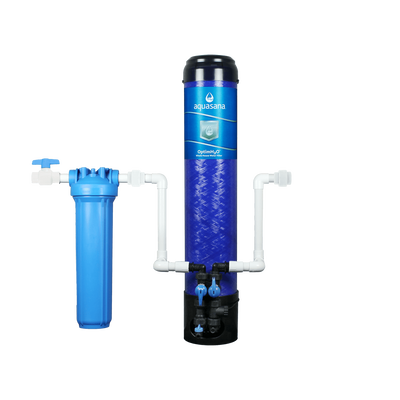Pros
- Remove Contaminants: Whole house water filter systems can eliminate harmful contaminants, including chloramine, chlorine, pesticides, heavy metals like iron and lead, bacteria, and much more. Some of these pollutants can threaten the health of the people in your household, and in extreme situations may even be fatal if health conditions are left untreated.
- Protect Pipes and Home Appliances : One of the most significant advantages of installing a whole house water filter is that they add protection for your plumbing and appliances. Unfiltered water may contain sediment that can build up in your pipes and negatively affect your appliances. With a whole house water filter that includes a sediment filter, your plumbing and appliances have protection, resulting in lower repair costs and improved lifespan. Homes with hard water will additionally need a water conditioner or a softener to tackle scale buildup to further protect pipes and appliances.
- Improve Skin and Hair: It may come as a surprise that a whole house water filter can even improve your skin and hair! When your water contains chlorine or chloramines, is hard, or has too much iron, this can cause dry skin and aggravate other skin conditions, such as eczema. If your water is untreated, this can also make your hair dry and brittle, especially when bathing. Additionally, whole house filters can improve your indoor air quality. When you shower, harmful chemicals evaporate into steam contaminating the air, making it worse for people who have respiratory diseases, such as asthma.
- Better Water Quality: The best whole house water filters improve the taste, smell, and even the texture of your water by balancing pH levels and removing any contaminants contributing to odor.
- Increase Your Home’s Value: Installing a whole house filter can increase your home’s value, as they are considered appliances that make a home more efficient and eco-conscious. Whole house filters are investments that pay off now and in the future when it’s time to sell your home.
WHOLE HOUSE
Rhino®
High-performance water filtration system reduces 97% of chlorine and more from every tap in your home for 1,000,000 gallons or 10 years.
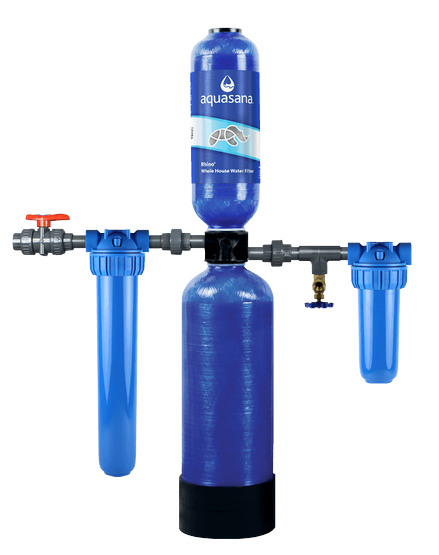
Cons
- Expensive Cost: The biggest disadvantage of a whole house water filter is that they can be expensive, with systems ranging from $300 to $2,000 and upwards. Although these systems can pay for themselves in the long term by reducing the need for plumbing maintenance and repair, the upfront cost is significant. Additionally, you may need to hire a plumber for installation which can add to the cost.
- Requires Space: A whole house water filter system requires additional space in your garage or basement to be set up, and some households may not have this space readily available.
- Not Suitable for Renters: If you live in an apartment, you likely won’t have access to the main water line and thus, would be unable to install a whole house filter. Additionally, moving these systems from rental to rental is impractical.
Are whole house water filters worth it?
The advantages of a whole house water filter speak for themselves, but it is also clear that these systems aren’t suited to every household. So, is a whole house water filter worth it for you?
To make the right decision for you and your family, consider the following:
- Do you own your home, or have permission from your landlord to install a system?
- Is it important to you that your plumbing is protected?
- Do you rely on groundwater?
- If you use city water, are you concerned that there may be contaminants in your supply?
- Would you like to see improvements in your hair, skin, dishes, and clothes?
- Would you gain peace of mind from knowing all your water is treated as it enters your home?
If you answered yes to one or more of these questions, installing a whole house water filter is worth considering.
How to choose a whole house water filter
If you’ve decided that a whole house water filter is right for your home, there are some factors you should consider when choosing between the many different models available.
System stages and filter types
The contaminants your system can filter will depend on the model you choose. The more filtration stages a system has, the more contaminants it can eliminate. If you want to address contaminants like chlorine, chloramines, or sediment, a 1- or 2-stage whole house filter may be all you need. However, if your water contains contaminants like PFAS, lead, or bacteria, you may need a specialized whole house system. Having your water tested will help you decide how many filtration stages your whole house water filter should have.
Keep in mind that systems with multiple stages typically require more frequent filter replacements. Ask yourself what is a realistic frequency for your household before making your decision.
Filter types are also important. A sediment filter tackles sediment, such as dirt, sand, and rust. Activated carbon filters will reduce chlorine and catalytic carbon filters will reduce chloramines. Other specialty filters like UV filters can sterilize bacteria, viruses, and cysts, and others are effective at reducing the presence of organic chemicals like VOCs, pesticides, and more.
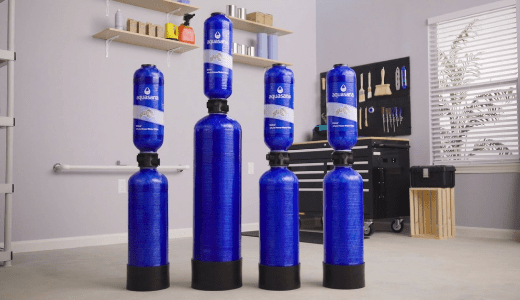
Filter capacity
The size of your home determines the filter capacity you will need. Larger homes or homes with more bathrooms require higher-capacity filters. If the filter capacity is too low, it will compromise your system's efficiency and could even lower your water pressure.
Certifications
Once you have identified which contaminants you need your system to eliminate, you should check that the system you are considering has been independently tested and/or certified. Reliable certification agencies include NSF, the International Association of Plumbing and Mechanical Officials (IAPMO), and the Water Quality Association (WQA). If the system hasn’t been independently tested or is uncertified, you can’t guarantee that the filter is effective.
Water flow rate
Flow rate refers to the volume of water that passes through your system and is measured in gallons per minute (GPM). The flow rate can be impacted by the amount of water you use, the size of your home, and the size of your pipes. When selecting a whole house water filter, it is crucial that the water flow rate is adequate or appliance functionality could be restricted.
We recommend choosing a system with a flow rate equal to or greater than your home’s usage — there are many resources online that can help you calculate this. As a benchmark, a whole house system that can handle a minimum of 5 GPM will be sufficient for most households, but larger homes will want Higher flow rate systems.
Softening/conditioning capability
Some whole house water filter models include a water softener or salt-free conditioner, which reduces the amount of any remaining heavy metals in the water. Softening your water isn't always essential, but it has many benefits including cleaner dishes, softer clothes, and a better smell and taste.
Cost
The price of a whole house water filter system can vary wildly, so you must ensure that the model you choose fits your budget. Whole house systems with more stages and add-ons like water softeners and UV filters will be more expensive. In addition to the system's upfront cost, you should also consider ongoing costs like replacement filters when deciding on your budget.
Making your decision
So, is a whole house water filter worth it for you and your family? The short answer is that whole house water filter systems are a worthy investment for many homes. And with some research and consideration, you can feel confident in your decision, whatever that might be. If you’re interested in purchasing a whole house system, check out our wide selection of filters to find the right one for your home.
